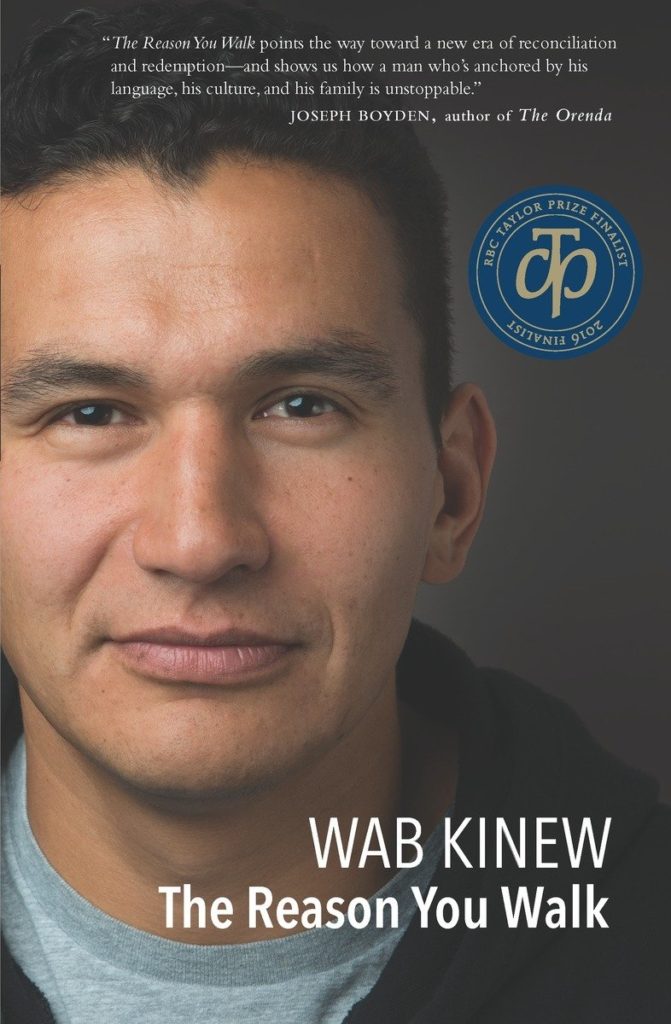“With Courage, Strength, and Grace”: The Reason You Walk by Wab Kinew
Written by Kristy Dolson
In North America, the month of July is marked by independence celebrations in Canada and the United States. But there is a dark underside to these celebrations lurking beneath the picnics and the plethora of national flags. I am referring to the historic oppression of North America’s First Nations and the ongoing struggle to right centuries of horrific wrongs in an increasingly globalized world. Last year, Canada celebrated its 150th year as a sovereign nation, and I was extremely fortunate to be home for it. But during a trip to Toronto, I saw fliers posted by an indigenous group protesting the celebratory attitude, claiming – rightly – that it was marking 150 years of oppression. I was saddened because I agreed, but vexed because the group had chosen to incite anger rather than provide ideas for change.
 Before I begin with the review, a little history lesson is required: Canada’s greatest injustice towards the native population were the government-sponsored and church-administered residential schools. Thousands of children across the country were forced to attend these boarding schools with the goal of separating indigenous children from their home cultures and assimilating them into the Euro-Canadian system. When parents refused to cooperate, their children were forcibly abducted by government agents. These children were beaten for speaking their native languages, indoctrinated into European values and beliefs, kept from returning to their families until they were adults, and were oftentimes the victims of sexual assault. The last residential school was closed in 1996, but the effects of residential schools continue to spread and influence relations between native and non-native communities alike. As demonstrated by the fliers, there are some on both sides who argue that reconciliation is not possible in the aftermath of such cruelty.
Before I begin with the review, a little history lesson is required: Canada’s greatest injustice towards the native population were the government-sponsored and church-administered residential schools. Thousands of children across the country were forced to attend these boarding schools with the goal of separating indigenous children from their home cultures and assimilating them into the Euro-Canadian system. When parents refused to cooperate, their children were forcibly abducted by government agents. These children were beaten for speaking their native languages, indoctrinated into European values and beliefs, kept from returning to their families until they were adults, and were oftentimes the victims of sexual assault. The last residential school was closed in 1996, but the effects of residential schools continue to spread and influence relations between native and non-native communities alike. As demonstrated by the fliers, there are some on both sides who argue that reconciliation is not possible in the aftermath of such cruelty.
Wab Kinew is not one of those people. Although his early life was marked by intolerance and violence, he has become a respected First Nations spokesperson who worked as a journalist for many years before pursuing a political career with the New Democratic Party of Canada. When Kinew found out that his father had received a terminal cancer diagnosis, despite a tumultuous upbringing, he spent 2012 reconnecting with this emotionally distant man in an effort to salvage their relationship before it was too late. The Reason You Walk is the memoir he wrote after that year of love, loss, and lessons.
This memoir is important because it explores the far-reaching consequences of a man’s residential school experience for himself and his loved ones. Kinew wanted to add his voice to the ongoing conversation regarding truth and reconciliation in a nation that is still fractured by the mistakes of the past. And so this book attempts to educate and inform, with Kinew’s direct and honest writing style. He is not afraid to reveal the worst of himself and his own past mistakes, while being upfront about the work he needs to put in for a better future. His memoir has uncomfortable moments and that is good. We should all be uncomfortable with the consequences of this national legacy. That is how we grow and become better people. If we gloss over the mistakes of the past or ignore them, then we fail to learn from them. These stories are vital in a world that increasingly seeks to divide and enrage. Institutionalized racism and imperialism are quite alive and well, and without these stories we can never hope to overthrow these oppressive systems.
A legacy is something that we hand down from one generation to the next. The previous generations of European settlers in North America have handed down a legacy burdened by intolerance, cruelty, and racism. But it is not impossible to overcome this legacy and to create a new legacy of reconciliation, truth, and trust. We must do this, because our legacy is no longer a matter for individual countries. In this era of globalization, it is critical that societies around the world address these issues so that nations can stand strong and united. This memoir is a triumph of the human spirit, the fight for one’s identity, and the struggle to forgive in order to forge a stronger connection for the future generations of all communities. The Reason You Walk demonstrates that if a father and son can heal and renew a broken bond, then perhaps reconciliation on a national scale is within our reach. We do not always have to be at war with ourselves; with hard work and honesty, I have faith that one day we will arrive at our common destiny as humans with hands held firmly as we walk that road together.
The Author
Kristy Dolson lived in South Korea for five years before taking a year off to travel, read, and spend time with her family in Canada and Australia. She holds a Bachelor of Education and has just moved to Yeosu where she splits her time between teaching at the new Jeollanamdo International Education Institute and reading as much as she can.





